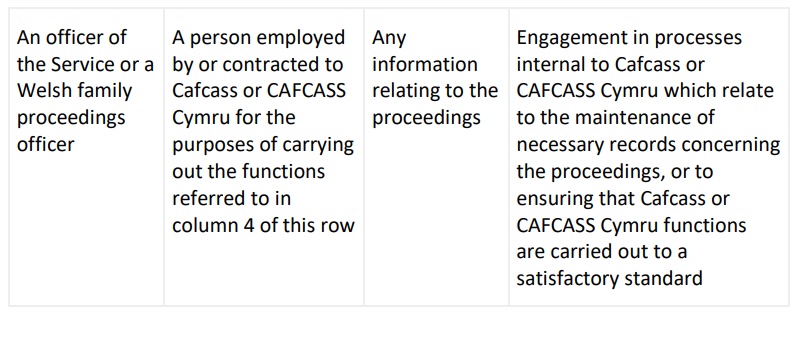We wrote about the Cafcass in-house psychology service ‘that no one seemed to know about’ back in April and again in October.
We received replies on 10 November from Cafcass Governance to our follow-up freedom of information questions. We weren’t satisfied with these replies and notified Cafcass that we would be writing along the lines below. In response, the Cafcass Governance Team passed us on to senior management and asked for a few days to get back to us (until 29 November). However they didn’t keep to their own deadline to give us any more answers, so rather than even more delay, here are our third set of questions, the Cafcass responses, and our comments.
1. Please confirm whether the contract for services with Kingsham Consultancy Ltd to deliver the service requires that company to notify Cafcass of the identity of the individual psychologists.
Reply:
Cafcass can advise that the contract for services with Kingsham Consultancy Ltd to deliver the service does not require that company to notify Cafcass of the identity of the individual psychologists.
2. Please provide the names of the individual psychologists delivering services under the Cafcass Psychology Service and copies of their CVs as held in your records.
Reply:
Cafcass can advise that we contract Kingsham Consultancy to fulfil the contractual requirements of the Psychology Service. We cannot provide the names or CVs of any individual psychologists as we do not work with them in this as individuals in this way. Sharing that information does not form part of the contractual requirements and we do not hold that information within our records.
Comment:
Replies to Questions 1 and 2 make it clear that Cafcass is not in a position to check the level of qualifications and the status of the individual psychologists consulted via the service, nor is it able to provide details of the individuals that would enable us (or Cafcass) to check whether or not they are professionally regulated or have suitable expertise to be advising Cafcass officers on the sorts of issues that the contract covers, or to enable anyone to check whether there is any conflict of interest. We think it it is unsatisfactory that the evidence of Cafcass officers may be based on or influenced by the views or guidance of individuals over whom Cafcass and the court have no quality control.
3. How many other psychology services submitted tenders for the contract that was awarded to Kingsham Consultancy Ltd in June 2023?
Reply:
Cafcass can advise there were two tenders.
Comment:
This reply is satisfactory as it suggests a proper tendering process was undertaken.
4. Please provide a copy of the quarterly reports concerning the service which are presented to the Cafcass Operational Management Team. I understand these contain a summary overview of the number of consultations that have been provided by the service, broken down into region, and feedback from practitioners and the provider on the effectiveness of the service concerning the use of the service by region. Please provide these reports for a period of three years.
Reply:
Cafcass can advise we publish our performance related stats on the Cafcass Board which are available publicly on our Cafcass website. [Here is the embedded link they gave us: https://www.cafcass.gov.uk/about-us/our-reports-and-publications/board-meeting-reports ]
Comment:
This response does not engage with our request for documents, which were documents that Cafcass had told us existed in previous answers (that’s how we knew to ask for them). Instead, we have been directed to a particular link on the Cafcass website, the clear implication being that the material requested is at the linked location. One of the reasons for our very first request on this topic was because there is no substantive information about this service on the Cafcass website, either at the URL provided or generally (we have re-checked to see if anything extra has been added at the linked location or generally – it hasn’t). If Cafcass consider that they are exempt from providing this information they have not said so and have given us any explanation. This is not our first experience of being given a purported answer about the psychology service which in fact simply does not address the question, and we have reached the conclusion that this obfuscation is intentional.
5. Given that the service involves communication of information relating to proceedings, please can you clarify which part of the Family Procedure Rules 2010 the service operates under or what judicial permission is relied on?
Reply:
Cafcass can advise that the Psychology service does not have access to the Cafcass case file. The information provided to the psychology service is limited to the information contained on the referral form which will set out the issue which the FCA wishes to discuss. The referral form does not contain any identifying information such as the name of the family or the child/ren involved. The psychologists are used to provide reflective supervision and a psychological perspective on risk management only. Cafcass is permitted to communicate information relating to proceedings to the national psychology service by Paragraph 3.1 of PD 12G to the FPR 2010 which permits communication of information as follows:

Comment:
These responses concerning the restrictions on sharing of information relating to proceedings in the context of Section 12, Administration of Justice Act 1960 and the FPR also leave us with concerns. We acknowledge that Cafcass officers do not identify parties or pass papers from the casefile to the psychologist. However, this is irrelevant to section 12. Sharing information ‘relating to proceedings’, anonymised or not, regardless of whether or not it is transposed into a separate document such as a referral form, and regardless of it being then held confidentially by the recipient – is a potential breach of section 12 – unless it falls within the parameters of the FPR or permission has been given.
We struggle to see how sharing information with a psychologist falls within the record-keeping or operation of Cafcass as envisaged by para 3.1 of the Practice Direction, which it appears Cafcass say they rely upon to render this non-consensual covert sharing lawful or appropriate.
This is the third time we have asked about the data sharing policy underpinning this service, and the first time we have got any sort of direct answer. We don’t think the lawful basis they have come up with covers the scenario in question in terms of contempt of court provisions, and we wonder if anyone had really applied their mind to this issue at Cafcass before we pressed the point.
6. Please can you identify what lawful basis Cafcass rely on to share data about children and parents under the Data Protection Act 2018 and GDPR?
Reply:
We process personal data to carry out our public task and statutory obligations, which are set out in section 12 of the Criminal Justice and Court Services Act 2000. Our obligations are to:
• safeguard and promote the welfare of children;
• give advice to the family courts;
• enable children to be represented in the family courts; and
• provide information and support to children and their families.
We process special category data, such as health and ethnicity data, where processing is necessary for reasons of substantial public interest (necessary for statutory and government purposes as set out in section 12 of the Criminal Justice and Court Services Act 2000).
Comment:
This explanation about lawfully sharing personal data under data protection legislation does not allay our main concern that Cafcass officers are likely to be inadvertently in breach of the Administration of Justice Act 1960 every time they pass information about private court proceedings to the Kingsham Consultancy, without the appropriate permissions being in place.
Neither the court nor the parties are aware that Cafcass officers may be influenced by or basing their recommendations on the professional views of a person unknown to the court and who has not seen the papers or spoken to the parties. The parties are afforded no opportunity to consent or object in advance, nor to scrutinise or challenge any subsequent recommendations. It appears that Cafcass is not ensuring a transparent understanding of the processes which have led to the officer’s recommendations to the court. We appreciate that Cafcass characterise the service as a ‘supervision’ service rather than an expert psychological assessment, but in the absence of transparent working, there is scope for legitimate concern about the extent and appropriateness of influence on recommendations, evidence and outcomes.
The concerns we have are of course compounded by the failure to deal properly with question 4, which would at least have told us how widely the service is being used and what impact it is felt to be having, at least by those who know about its use.
The Cafcass Privacy Notice for Adults (Accessed as at 29 November 2023), which is where the response to this question is drawn from, also states the following under ‘who we share your information with’:
Commissioned services
We may share limited information with our commissioned services which provide court ordered activities. This work is carried out under strict terms and conditions.
We only share information with these services when the activity has been ordered by the court.
The equivalent children’s policy is in similar terms. However, this doesn’t apply to the psychology service because the service doesn’t provide ‘activities’ and it isn’t court ordered (because the court doesn’t know about it). There is nothing else in the policy which might conceivably alert a parent (or a child) to the fact that their data is being or might be shared for these purposes with this sort of commissioned service (processed) in this way. The ICO website says that
Individuals have the right to be informed about the collection and use of their personal data. This is a key transparency requirement under the UK GDPR.
Conclusions:
The process of trying to find out about the role of the psychology service has been protracted and time consuming. We have been in correspondence on this topic with Cafcass since April. We believe that Cafcass is deliberately withholding information that is in the public interest, but we don’t think further attempts by us are going to get anywhere.
Perhaps lawyers representing parents might feel that they should routinely ask the Cafcass officer who wrote the report for court whether they have relied on an unidentified psychologist in coming to their recommendations. The difficulty with this is that officers are apparently instructed they must not disclose this information which puts them in a very difficult position of conflict between employer, court and the parties and subject children in the case.

My daughter had to undergo an assessment as part of her case, at no time was it explained she could refuse, that she could nominate her own ‘expert’. My daughter had a language disability , no allowances or support were provided. She was unaware that medical records and private personal information would be disclosed and written in a 150page report.
Parties don’t get to nominate their own expert at will. Experts are only permitted where ‘necessary’ – someone who wants an expert involved will need to persuade the court that the case requires this additional assistance. Experts are usually jointly instructed by all parties, and if the parties don’t agree on the identity of the expert the judge will decide who is most suitable from those proposed.